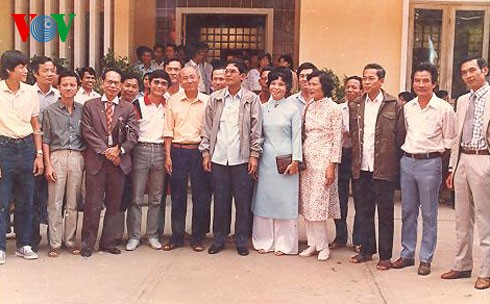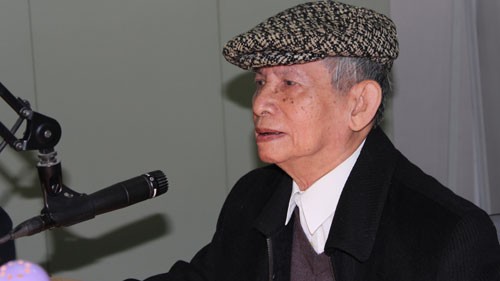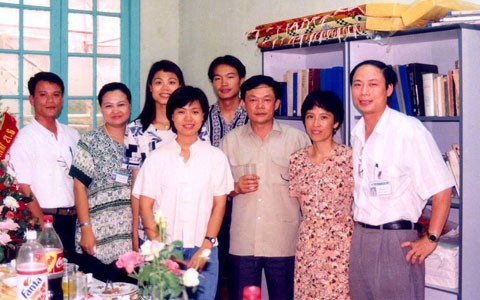(VOVworld) - The affection and gratitude of former experts of VOV’s Overseas Service for Cambodia will never fade.
 |
| Cambodian PM Hun Sen and Vietnamese experts in the National Radio and Television of Cambodia (in 1988) |
Going on overseas business trips is a common occurrence for many who work in the Overseas Service. During the war, people were happy to make such a trip, even for though they were often under-funded.
In the 1980’s the department’s staff of experts were sent to assist the National Radio of Cambodia for almost a decade. It was a proud and commendable chapter in the chronicles of the Overseas Service!
History records numerous trips abroad by Overseas Service cadres to the former Soviet Union, China, Cuba, Laos, and Cambodia. The mission was different in each nation. In some places, VOV cadres worked for the host countries, but in other cases the hosts worked for VOV. But only in Laos and Cambodia, the two neighbors with a near-sibling closeness to Vietnam, did Vietnamese experts offer help free of all calculation. We understood that helping Cambodia was helping ourselves!
In 1979, when Cambodia had just escaped from the brutal Khmer Rouge genocidal regime, Vietnam was experiencing a subsidy period and struggling with two wars – one in the north and the other on its southwestern border. At that time the inflation rate reached 800%. Despite such difficulties, Vietnamese people remained ready to give Cambodian people a hand whenever they needed it!
The Overseas Service played an important role in the K34 delegation of Vietnamese experts to Cambodia. The Overseas Service’s leaders were asked to lead the delegation’s activities, first Nguyen Van Thu, followed by Mai Thuc Long, To Hoi, and Hoang Minh Phuong, all members of the Overseas Service.
 |
Mai Thuc Long, former Deputy Director General of VOV was among the first Vietnamese experts to Cambodia.
|
Senior officials of functional sections of the department, including Le Van Diem of the English section, Nguyen Dinh Trang of the French section, Nguyen Van Tien of the Lao section, and Le Tien of the newsroom, one after another, set off to Cambodia. They were among the first to experience the easily days of hardship, going to sleep at night worried about possible ambush by the Pol Pot forces in their backyard. Then came days when we were given a daily allowance of 6 riels, just enough to buy a pack of Samit cigarettes from Thailand. During the later days, experts like Vu Hai and Do Van Loan felt their lives were wonderful despite the ups and downs.
During that decade, since the Cambodians didn’t know much about radio broadcasting and had little knowledge of foreign languages, experts from the Overseas Service helped them gradually improve their professionalism in broadcast journalism and politics and set up a group qualified to create programs in English, French, Thai, Lao, and Vietnamese. With Vietnamese assistance, several Cambodians became leaders of the radio station and others were put in charge of television, information, and newspapers.
One interesting aspect of the Overseas Service was that certain Cambodians worked as cadres within the department. When Cambodia was liberated, they returned home and held various important positions in Cambodia’s political system. One of them was Keo Chan Da, who became the Minister of Culture and Information. The Secretary of Pnom Penh’s Party Committee was another example.
The affection of Cambodian people for members of the K34 delegation, and the Overseas Service in particular, was last forever. I will never forget the time when Vietnamese experts had to live in extremely poor conditions but were ready to give their own rice to poverty-stricken Cambodian families. And how could I forget gala nights full of joy, Cambodian folk songs and dances, parties at the Royal Palace, and excursions to picnic along the Mekong River or visit the Angkor Thom and Angkor Wat temples?
For the Overseas Service experts, the time working in Cambodia will always seem fresh. 10 years was a period of time long enough to measure the spirit and perseverance of each editor or reporter. Some of them are no longer living. Nguyen Van Thu, Le Van Diem, Nguyen Dinh Trang, and To Hoi are gone but who would dare say that they have left behind those unforgettable days when they worked as experts in a neighboring country.
Names like Independence Monument, Stung Meanchey Bridge, Monivong Avenue, and Olympic Market are still familiar to the rest of us. Each place left a strong impression. The faces of Cambodian friends who shared both the bitter and the sweet and the work we did will never fade. If you ask former head of the English section of VOV’s online newspaper, Nguyen Duc Phu, about his Cambodian friends, he will mention Tay xam Bo. Dao Dinh Tuan, ex-director of the Overseas Service, would recall immediately the name of Cham Thi. And Pham Van Yen would say he will never forget the smile and warm voice of Xo Khani on those gala nights.
 |
| Dinh The Loc (the man holding a glass), a former Vietnamese expert in Cambodia and former director of the Overseas Service. |
The difficulties of those days in Cambodia forged long-lasting friendships. All of the Overseas Service staff shared a feeling of happiness after the business trip that made them more mature and experienced. Many of them were promoted to higher positions - Mai Thuc Long, Dao Dinh Tuan, Dinh The Loc, Hoang Minh Nguyet, Nguyen Quang Thep, Nguyen Van Khiem. Most of us thought only of contribution and sacrifice, not of acquiring status, when we agreed to work in Cambodia as experts. We departed in response to the call of the Party and State, our conscience, and our personal dignity.
Thirty years have passed since the Overseas Service sent its experts to work in Cambodia. The situation in both countries changed a lot, but the relationship will never die. That time was a brilliant era for VOV’s Overseas Service.
As I write this article, the time I worked in Cambodia seems as if it just took place yesterday.